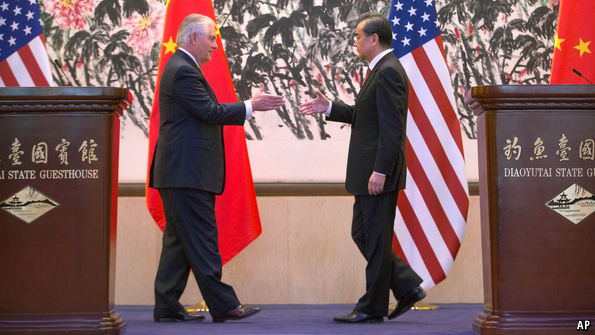Is Donald Trump mulling a new approach?

ARE China and America preparing some sort of grand deal, to put their relationship on a new footing? Rex Tillerson appeared to hint at this during his first visit to Beijing as America’s secretary of state on March 18th and 19th. Whether such a deal is really possible is a different matter.
Before the visit, the State Department’s acting head of Asian affairs said the new administration had not devised a term encapsulating American policy towards Asia, but she suggested it may no longer be called a “pivot”. In an interview during his trip, Mr Tillerson said China and America were at “somewhat of a historic moment” in their relationship. He said they needed to have a “fresh conversation” about what would define it for the next 50 years.
Latest updates
Obituary: Martin McGuinness died on March 21st
The demand for Nigerian debt
James Comey says the FBI is investigating possible links between Trump and Russia
A new study tries to unpick what makes people happy and sad
IAG enters the low-cost, long-haul market
Two questions senators should ask Neil Gorsuch about natural law
Perhaps most tellingly, at a news conference with his Chinese counterpart, Wang Yi, Mr Tillerson talked about basing the relationship on “non-conflict, non-confrontation, mutual respect [and] win-win co-operation.” This is a Chinese formulation. Under Barack Obama, the Americans refused to adopt it because China uses the term “mutual respect” to imply that others should respect its “core interests” (such as domination of the South China Sea). Mr Tillerson’s use of the formula caused a backlash in Washington, DC. One Democratic adviser to the previous administration tweeted that it was “a big mistake”. China’s official media also noted it—approvingly.
The phraseology is associated with Xi Jinping, China’s president, who, at a summit in 2013, asked Mr Obama to agree to “a new type of major-country relations” based on the principles now being suggested by Mr Tillerson. The Obama administration did not respond. It is possible that the Trump administration might.If it does, there are substantial obstacles to clear away first. For one thing, the State Department (like several other departments in Washington, DC) has only a skeleton staff. The official in charge of Asia is a holdover from the Obama team. For another, Mr Trump’s officials are continuing to push diametrically opposing policies. Take trade, which is central to the America-China relationship. Peter Navarro, the head of the National Trade Council, espouses protectionism and confrontation. Gary Cohn, the director of the National Economic Council, supports free trade and co-operation.
Crucially, there are few signs that the traditional disagreements between the sides are becoming easier to manage. Before he arrived in Beijing, Mr Tillerson said that all options (including military force) would be on the table if North Korea persisted with its development of nuclear weapons. That country promptly raised the stakes further by testing a new high-thrust rocket for a ballistic missile. Mr Tillerson’s visit did not appear to narrow differences between China and America over how to deal with Kim Jong Un, the North Korean leader. China wants America and South Korea to end their joint military exercises in exchange for a North Korean freeze of its nuclear and missile programmes. America has rejected the idea.
On the eve of Mr Tillerson’s departure, American media were filled with reports that the administration was preparing a big new arms sale to Taiwan, which is certain to incur China’s wrath. (Taiwan is paramount among its core interests.) And Axios, an American online newspaper, has reported that White House officials are preparing measures to punish Chinese trade practices in the car business: Chinese tariffs on imported cars are around ten times American levels.
Mr Trump has reportedly invited Mr Xi to his club at Mar-a-Lago, Florida, in early April. Mr Tillerson did not confirm when the meeting will take place. Perhaps they have too much to talk about before they can agree on a date.
No hay comentarios.:
Publicar un comentario